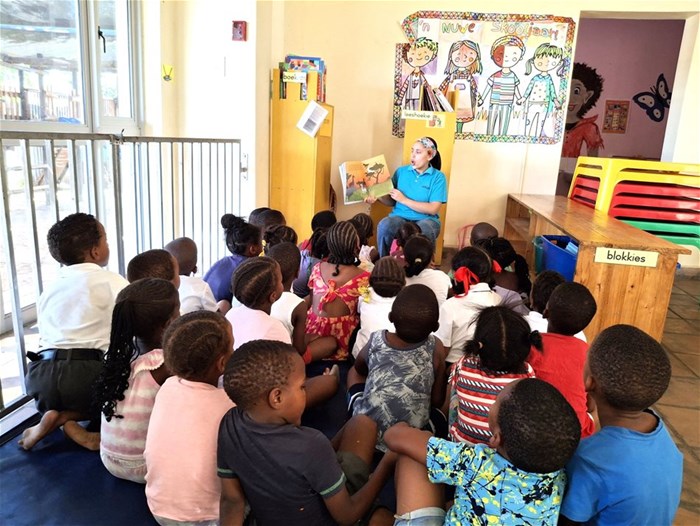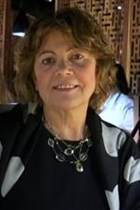Butterfly House: Unfolding hope
But in the middle of this hardship stands a place of safety and compassion: Butterfly House.
A safe place to grow
Butterfly House was established by the Drakenstein Palliative Hospice during the HIV pandemic. Originally created to care for children affected by the virus, the centre has since evolved into a support hub for vulnerable children in the community.
Today, it is a vital lifeline for many families. Children come here to feel safe, to learn, and to heal. They receive meals, emotional support, education, and health care - essentials that are often out of reach at home.

Social worker Helga Williams-Harris leads the team with warmth and dedication. Alongside another social worker, a social auxiliary worker, and early childhood development (ECD) educators, and youth facilitators, she oversees programmes for children aged 3 to 18.
“Many of the children come from homes where their parents are absent or battling addiction,” Helga explains. “Butterfly House provides structure, care, and a sense of belonging.”
Early childhood development and emotional support
The ECD programme follows a Department of Education-approved Amazing Brainz curriculum, helping young children build a strong foundation for learning. But more than that, it provides emotional safety and nurturing. Children are taught to trust, express themselves, and relate positively to others.
Helga and her team are trained to see beyond difficult behaviour. When children act out, it’s often a sign of stress or trauma. “We focus on understanding where the behaviour is coming from,” Helga says. “Then we can support them in a way that helps them feel safe.”

Meeting basic health and nutrition needs
Butterfly House also addresses issues of health and nutrition—areas where many families struggle. Through its partnership with the hospice and local health services, children receive education on common conditions, and screenings for vision, hearing, oral hygiene and nutrition.
“Some children arrive with untreated infections or dental problems. Many are undernourished,” Helga says. “We do what we can to make sure they’re healthy enough to learn and thrive.”
Each ECD child receives breakfast, snacks, and a warm lunch every day and a cooked meal is provided for the children attending the afternoon programmes. In extreme cases, extra food is provided for families.
Supporting families, building community
Parents or guardians apply each October for their children to attend. Butterfly House prioritises those most in need, based on household income and family circumstances.
The centre doesn’t just support children, it also works with families. Monthly parent workshops focus on practical topics like child development, substance abuse, and positive parenting. Over time, this outreach has helped build trust and encourages more parents to ask for help when they need it.
“We try to meet families where they are,” Helga says. “It’s about walking the journey with them, not for them.”
A place to learn and belong
The aftercare programme supports over 200 school-aged children. Primary learners attend in the afternoons, and high school learners come in the evenings. Sessions include homework help, life skills education, and open conversations about challenges such as peer pressure, safety, and healthy relationships.
To encourage positive behaviour, the centre runs a simple but effective reward system. Children earn points for kindness, helpfulness, and taking responsibility as well as attendance. These points are exchanged for donated items like toiletries, school supplies, clothing—and most often, food.
Despite the challenges, success stories are growing. Two former Butterfly House students are now attending the University of the Western Cape, and four others are at college. Their achievements reflect the long-term impact of early care and encouragement.
Helga’s reflection
“This work can be tough, but it’s worth it,” Helga says. “We might not be able to change everything at home, but we can make sure that, for part of the day, children feel valued, heard, and safe.”
On World Social Work Day, the children surprised her with handwritten notes of thanks. “I keep them close,” she says. “They remind me of the difference we’re making.”
About Butterfly House:
- Founded by: Drakenstein Palliative Hospice during the HIV pandemic
- Funding: Department of Education (ECD), Department of Social Development, donations, local businesses and overseas funders
- Leadership: Elizabeth Scrimgeour CEO; Justine Goliath (Social Worker and Operations Manager); Helga Williams-Harris (Butterfly House Co-ordinator and Social Worker)
- Staff: 2 social workers, 1 social auxiliary worker, ECD educators and youth facilitators
- Volunteers: Assist with academic support, reading, creative activities, and more
- Capacity: 220 children in aftercare; 46 in ECD
- Services: ECD education and aftercare programmes focusing on academic support, social and professional skills and therapeutic programmes. The pillars of change are health and wellness, safety and security, personal capacity development, education and health literacy.
- Needs: Reliable funding, stronger government support, food and hygiene donations
- Who can help: Donors, healthcare professionals, volunteers, child advocates, the community, business CSI programmes

About Marilyn Keegan
Former award-winning journalist who worked at the Rand Daily Mail, Cape Times and Fair Lady magazine, Marilyn is the Communications Manager at COHSASA, a not-for-profit company that seeks to improve healthcare delivery in developing countries. Marilyn has a post-graduate degree from the University of Cape Town and writes poetry in her spare time.- First hospital in Malawi is accredited to international standards06 Feb 11:45
- A major milestone for Malawi in health care02 Feb 16:06
- South Africa’s palliative care standards gain global recognition20 Oct 10:43
- Cohsasa celebrates 30 years of strengthening healthcare quality across Africa06 Oct 15:27
- African healthcare leaders reimagine patient safety27 Aug 14:06























